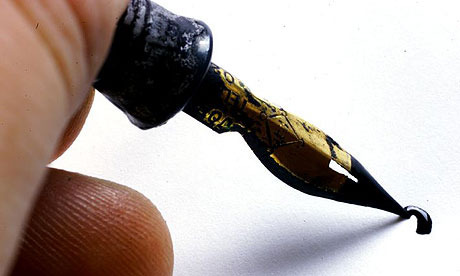Anna Beer's Blog, page 3
March 26, 2014
How do you bring your teenage child to books?

Advice of words ... a mother and daughter share enthusiasms. Photograph: John Henley/Corbis
Zadie Smith wrote recently about her reluctance to read, as a teenager, the books her mother thought she ought to. Until, that was, she finally opened Zora Neale Hurston's Their Eyes Were Watching God, which she read in three hours (or "inhaled" - a glorious verb) and which opened her eyes to a new way of being, a new way of writing. Smith's account of her response shows her to have been an astonishingly astute writer and critic even at 14, but perhaps everyone who gives a book to another person, especially a young person, hopes for that epiphany, even if it is never expressed so eloquently. My daughter is 16, and I catch myself longing for her to find the book that she'll "inhale" in this way. Put more crassly, I wish she didn't read celebrity magazines - and pretty much only celebrity magazines.
Why must fictional sickness mean more than itself?
Regular readers of my somewhat sporadic blog posts will note that I do seem rather absorbed with suffering, despair and death. Today you'll be delighted to hear it's illness. Woody Allen created the line "I am not afraid of death, I just don't want to be there when it happens" - but writers put us in the room with sick people, with the dying, and want us to react. I've just re-read, for the purposes of this article (little else would make me pick up a Hardy novel these days) the end of Jude the Obscure, and even this Hardy-hater has to admit that the way that our hero Jude coughs away his life, and our villain Arabella maintains her disgustingly rude health (not to mention her unwillingness to nurse), is a powerful and angry use of illness as metaphor, in which Jude's illness is actually a sign of his wasted talent, and Arabella's health is a sign of her limitations and ironically her success.
Hardy is at the end of a 19th-century tradition of depicting illness which often uses illness as a metaphor for an emotional state and/or as punishment for sin - sometimes leading to recovery and redemption, sometimes to death. Jude's cough is not just a cough - it is a sign of his special vulnerability, his unfitness for this world. Think of Jane Austen using punitive illnesses to ensure that her wayward characters return to the proper path - Marianne Dashwood in Sense and Sensibility, or Tom Bertram in Mansfield Park. (I'll leave it to others to analyse Dickens, and Eliot, and Braddon, and the Brontës...). These depictions of illness allow "good" female characters to emerge as idealised nurses - Anne Elliott, Esther Summerson - and reveal "bad" female characters who just won't mop brows (we're back to Arabella again).
Why didn't I learn poetry like the Elizabethans?

What comes next? A trained memory seemed to ease life for the imprisoned Elizabeth.
I have been researching the ways in which writers learned to write in the past. I would like to suggest that we have lost some rather good things - one being the importance of memorising material, another the merits of translation.
My pen fetish

Quill you be mine? ... fountain pen. Photograph: David Sillitoe
I have (very) recently been introduced to the Fountain Pen Network, in which questions such as "How brown is Havana Brown?" are posed (and better still, answered), and the virtues of Vintage Swan Nibs discussed in exciting detail.
How the mainstream dilutes literature

Well, their feet didn't ... Groom and bride. Photograph: Corbis
I was recently in an Anglican church - a friend was getting married, and it was a joyous and intense experience, as weddings should be. The culmination of the marriage celebration was the fervent singing of Jerusalem. Since then, however, I've been worrying away about Jerusalem - wedding favourite, beloved chant of England's cricket and rugby supporters, and, of course, perennial anthem of the Women's Institute. The words are William Blake's (though Parry's music is what has made it so popular) and come from his Milton: A Poem in Two Books - and that is my problem. The poem we know as Jerusalem is part of the prefatory material for a long exploration of the connection between poetry and radical action and belief, with more than a hint of apocalyptic zeal. Here's just a bit:
January 23, 2008
How the mainstream dilutes literature

It upsets me how writing that began life as radical so often gets sanded down into something that seems cosy and familiar

Well, their feet didn't ... Groom and bride. Photograph: Corbis
I was recently in an Anglican church - a friend was getting married, and it was a joyous and intense experience, as weddings should be. The culmination of the marriage celebration was the fervent singing of Jerusalem. Since then, however, I've been worrying away about Jerusalem - wedding favourite, beloved...
January 16, 2008
My pen fetish

They're beautiful, and they make me feel more of an author, somehow. Not that I'd use them to write my books

Quill you be mine? ... fountain pen. Photograph: David Sillitoe
I have (very) recently been introduced to the Fountain Pen Network, in which questions such as "How brown is Havana Brown?" are posed (and better still, answered), and the virtues of Vintage Swan Nibs discussed in exciting detail.
I have not yet registered, out of lack of fountain pen knowledge, rather than lack of interest, ...
January 3, 2008
Why didn't I learn poetry like the Elizabethans?

It sounds boring, but I wish I'd been made to memorise prose and verse. Then I'd have a private fund of inspiration

What comes next? A trained memory seemed to ease life for the imprisoned Elizabeth.
I have been researching the ways in which writers learned to write in the past. I would like to suggest that we have lost some rather good things - one being the importance of memorising material, another the merits of translation.
Memorising vast amounts of text lay at the heart of a schoolboy's...
November 29, 2007
Why must fictional sickness mean more than itself?

Novels have long been using illness for metaphorical purposes, but few depict the ghastly facts of disease and dying straightforwardly
Regular readers of my somewhat sporadic blog posts will note that I do seem rather absorbed with suffering, despair and death. Today you'll be delighted to hear it's illness. Woody Allen created the line "I am not afraid of death, I just don't want to be there when it happens" - but writers put us in the room with sick people, with the dying, and want us to...
October 22, 2007
How do you bring your teenage child to books?

Oh, if only I could get mine reading something other than celebrity magazines.

Advice of words ... a mother and daughter share enthusiasms. Photograph: John Henley/Corbis
Zadie Smith wrote recently about her reluctance to read, as a teenager, the books her mother thought she ought to. Until, that was, she finally opened Zora Neale Hurston's Their Eyes Were Watching God, which she read in three hours (or "inhaled" - a glorious verb) and which opened her eyes to a new way of being, a new way of w...



